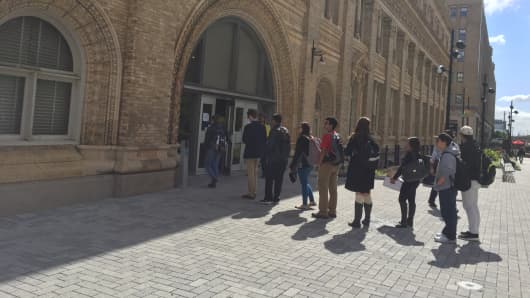We asked editors at college publications across the country: What presidential candidates are students buzzing about on your campus? Donald Trump? Hillary Clinton? In this first installment of CNBC's politics on campus series, we find out that, in fact, Drexel isn't buzzing about any of the candidates. Here's why.
A year from now, the presidential campaigns will be at their peak and it will be down to two candidates battling out to be the next POTUS. Until then however, there are quite a few candidates to weed out. With 6 major contenders from the Democratic Party and 13 from the Republican camp, this upcoming year will bring about a lot of excitement.
Already, we've seen our fair share of political drama with Donald Trump headlining almost every skirmish. And, while his antics have drawn in many viewers, he's not capturing the attention of young people. College campuses aren't buzzing with "Make America Great" rallies.
The truth is, college campuses aren't really buzzing with anything at all. Because many students aren't voting.
In 2008, 44 percent of 18-24 year-olds voted, the least out of all the age demographics. In the 2012 election, only 38 percent of 18-24 year-olds voted, again, the least out of all the age demographics. These decreasing numbers should be a reason for concern. The nation's youngest aren't voting.
I've discovered several reasons as to why my fellow students aren't hitting the polls. The simplest one is that students say the don't know how to vote. I was speaking to a friend and asked her who she planned to vote for. She stated that she couldn't vote because she didn't think she could make it back to Pennsylvania in time for the election.
This is a major misconception among students. There are ways to vote while still at school. For example, registering for an absentee ballot. This lack of civic engagement is something that high schools and universities need to take into consideration. Teaching people how to vote is the first step to getting them to the polls.
The second step is finding a way to teach them about the candidates. A lot of students don't care enough to learn about everyone who's running, especially in a race as packed as this one. But it's not that they need to know all the candidates — even a few would be better than none.
For those who know how to vote and are familiar with the candidates, but still choose not to go to the polls, it comes down to some level of disillusionment with the electoral system. They feel like even if they vote, their voices aren't being heard. In the aftermath of a year filled with increased racial tensions, some African-Americans are cynical about their value in the nation. They are tired of being treated as if they are second class citizens and electing officials who cannot protect them and their interests. For many others, they think that their vote is arbitrary. That, in the larger scheme of things, their one vote means nothing. But if thousands feel this way, then those single votes become thousands more. And those thousands of votes could make a difference, people just need to start believing it.
Many of those running in this upcoming election are facing the tide of social media. This is the new way to connect with our age group. Sharing links and clips of candidates is a good way to inform and pick up younger votes. Already we've seen candidates attempt to do so such as Bernie Sanders live tweeting the GOP debate with sarcastic remarks and the hashtag #DebateWithBernie.
Bernie tweet #1 Trump
Bernie tweet #2 Reagan
Bernie tweet #3 End
Maybe with the additional efforts of social media, there will be an increase of millennials at the polls.
Eunice Maya Kamami is student at Drexel University (Class of 2019), majoring in international studies and minoring in communications. Kamami, originally from Kenya, is also the opinion editor at The Triangle, an independent student newspaper on campus. Follow her on Twitter @EMKamami.






